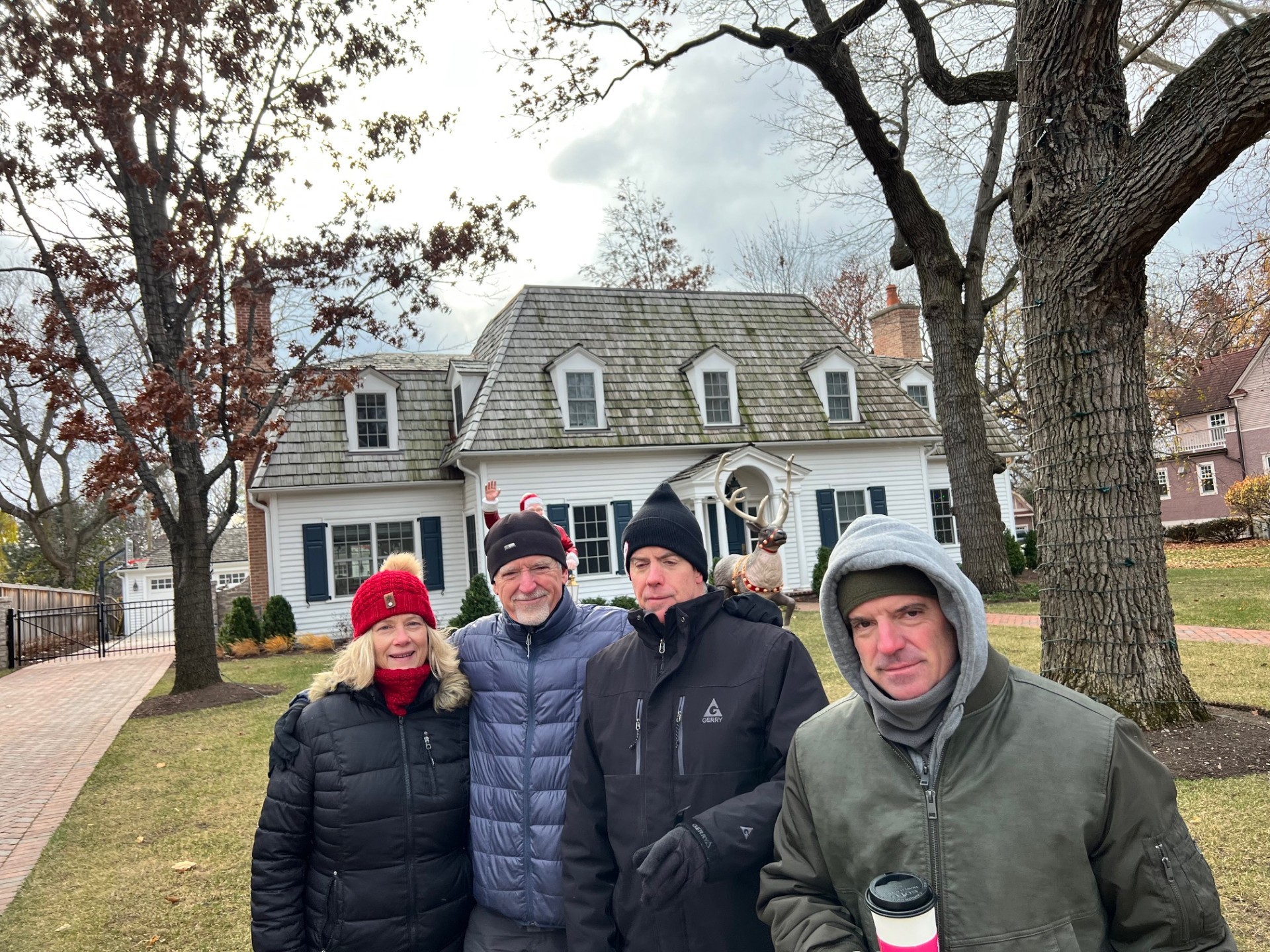It’s become an annual ritual to burn off calories. Our “morning after Thanksgiving” walk started at 8:30 am last Friday. It was sunny, clear, and cold when I met three of my brothers and the wife of one of them at the public library in Riverside, Ill.
Riverside is the Chicago suburb where we (the brothers) grew up, after settling there in 1963. It’s a nice, leafy town full of old trees and winding, non-linear streets. Riverside was designed in 1868 by Frederick Law Olmstead, known as the father of landscape architecture.
Our walk took about an hour as we moved through Swan Pond, a dry floodplain of the Des Plaines River. We proceeded onto what’s called the River Run, a two-mile loop tracing the raging Des Plaines (ha!) with grand old homes on one side and a green belt on the other.
It is always eye-opening for me to return to suburban Chicago after 30-plus years away. No one was out that morning except a few dog walkers. No one was in the library except the librarians, as we stopped in to use the bathrooms.
Most striking was the absence of “for sale” signs. Redfin and Zillow confirm it. Not one of the dozens of homes we passed is actively listed for sale.
A few “tributaries” extend off from the main roads we walked. Those side roads represent the homes of our friends, now and 60 years ago. Currently I see only one active listing in the entire enclave.
All of Riverside is two square miles. Approximately 12 single-family listings are now active there. For comparison, I drew a two-square mile rectangle encompassing the heart of Golden, Colo., where I live now. There are 25 active listings.

It would be silly to infer any conclusions—about market vigor or anything else. Riverside has an older population. A look at downtown Chicago, where the hipsters live, might tell a different story, more like downtown Denver.
But one factor stands out: property taxes. I reviewed three active Golden listings priced from $700,000 to $900,000. Their average property tax rate is 0.52 percent. A $868,800 listing has annual tax of $3,972,
Then I looked at three Riverside listings in the same price range. Their average tax rate is 2.36 percent. That’s 4.61 times the rate in Golden. An $899,900 home there has an annual tax bill of $22,644.

Where I come from, that difference is real money. An extra burden of $18,000 per year is $1,500 per month. Enough to make two ongoing car payments and take an annual vacation somewhere.
(There is no need to quibble about the imperfect match of market values with government assessed tax values, which can lag by a couple of years. The point is that Chicago area taxes are nearly five times Denver’s.)
In recent years, Illinois has nearly topped the list of states where people are leaving. U-Haul the truck rental company tracks these things. In 2023, Illinois was number three behind California and Massachusetts.
Colorado has been the near opposite end, with significant immigration, although that has slowed. Last year it was number 9 on U-Haul’s list of growth states. Texas and Florida were first and second.
Why are people fleeing Chicago? Property taxes are certainly a factor. Are they a cause or an effect? Some would say it’s the former. Higher taxes are driving people out.
But the brutal increases are also an effect. Property owners who stay in Chicago are left with a greater proportional burden to support the aging roads, schools, and government.
If the remaining owners don’t sell, maybe it’s because they can’t sell. Who wants a property with a “second mortgage” courtesy of the County Treasurer?

There are other factors. My siblings keep me abreast of Chicago’s decline. Red light cameras are everywhere, they say, installed to extract fines from unsuspecting motorists.
My brother John bought a $3.5 million condo downtown on Chestnut Street, just off the Magnificent Mile. The city has set up a migrant shelter next door. He can now witness violent crime and drug dealing from his 30th floor balcony.
The Covid pandemic brought a wave of staged, simultaneous walkouts in restaurants on Michigan Avenue. At a set time, everyone would stand up and leave without paying. It couldn’t be combatted. So for a while, all the nice restaurants were closed by 6 pm. The citizenry itself contributed to the chaos.
I don’t suppose the same factors affected the quaint café’s in Riverside, where my mom sold real estate in the 1980’s. But that area has its own issues.
So does metro Denver, with its crime and congestion. Still, Chicagoans considering a new start might do well to contact a good buyers’ agent in beautiful Golden, Colo.

